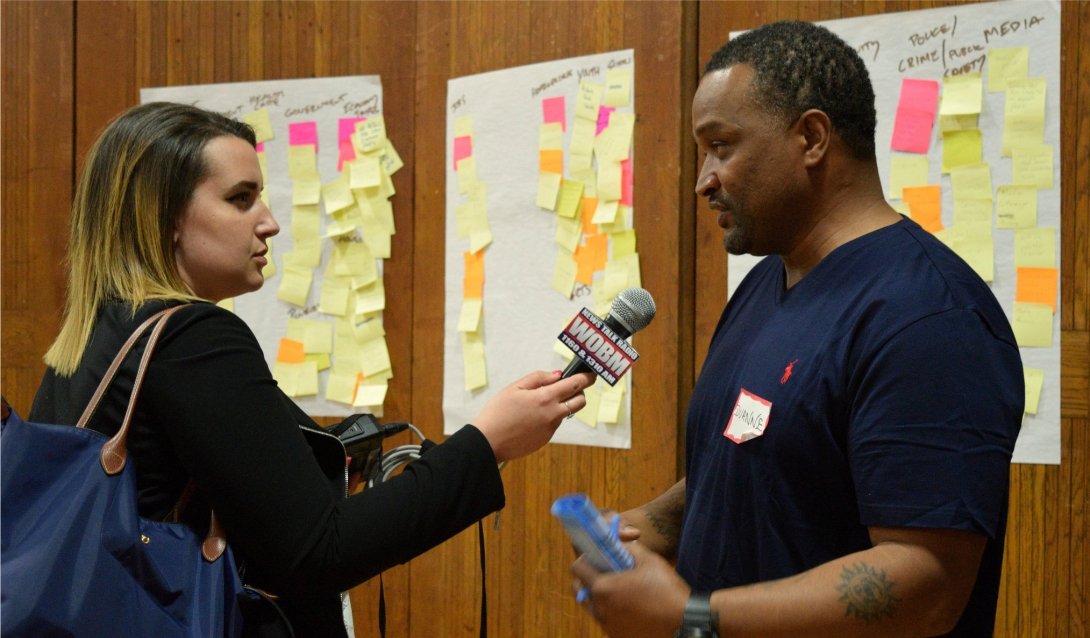A Once-in-a-Lifetime Chance to Fix New Jersey's News Crisis

A reporter connects with an Asbury Park resident at a News Voices: New Jersey event.
Vanessa Maria Graber
On March 15, I testified before the New Jersey Assembly Budget Committee about a once-in-a-lifetime opportunity to give state residents the news and information they need. My testimony appears below.
Chairman Schaer, members of the committee, thank you for providing me with this opportunity to speak.
My name is Mike Rispoli, and I am the journalism campaign director for Free Press and Free Press Action Fund, a nonpartisan, nonprofit media advocacy organization that fights for the public’s right to connect and communicate.
I was born and raised in New Jersey, and am a former statehouse reporter for Gannett newspapers and a former reporter with the Star-Ledger.
For the past two years, I’ve run a project here in New Jersey called News Voices, which works to connect newsrooms with the communities they are meant to serve.
We are currently active in six places: Asbury Park, Atlantic City, Camden, Morristown, New Brunswick and Newark. I am here today representing the nearly 18,000 Free Press members living in New Jersey.
Across the state, we’ve heard from countless people that they want better information and more coverage of where they live.
That’s why I am testifying today. I want to talk to you about a once-in-a-lifetime opportunity we have here in New Jersey.
One that would transform the ways people across New Jersey get information about where they live.
An opportunity that would make New Jersey a model for the rest of the nation.
The state is believed to have sold off several public-television licenses in a national auction conducted by the Federal Communications Commission. The auction ended in February, but the treasurer and Gov. Christie have indicated that the amount of money the state will receive from the sale will not be publicized until April.
However, Gov. Christie this week said that money from the sale of New Jersey’s public-media licenses will make up a part, but not the entire, anticipated $325 million in state-asset sales included in the recently released state budget.
I urge you to consider an innovative idea on how to use the revenue from that sale.
My organization Free Press, along with Montclair State University, the New Jersey Institute of Technology, Rowan University and Rutgers University, has submitted a proposal to create the New Jersey Civic Information Consortium, a joint initiative among the four universities.
The Civic Information Consortium would invest revenue from the sale into supporting projects that strengthen public-interest journalism, advance research and innovation in the media field, develop and deploy civic technology throughout New Jersey’s communities, and promote civic engagement.
For instance, with a one-time investment of $100 million from the proceeds of spectrum sale, the consortium over the course of 10 years could pay out up to $13 million a year to projects aimed at better informing New Jersey residents.
Some ideas we’ve heard from journalists and community members on what the consortium could invest in include:
- Locally focused digital startups
- Apps and tools to help people sift through public data or complex academic research
- Robust community-engagement projects designed to lift up voices newsrooms have long ignored
- Media-literacy programs to identify and combat the spread of so-called fake news and disinformation
Investing this money to promote informed and engaged communities could not come at a more urgent time.
New Jersey media have undergone a seismic shift over the past decade.
Since 2008, nearly 2,000 newsroom employees have lost their jobs. Dozens of papers have shut down. And consolidation has left huge portions of the state without any real substantial local coverage.
Studies have shown that when news coverage disappears, people are less informed, civic participation drops and political corruption increases.
People rely on locally produced news and information to engage with their neighbors, to learn about volunteer opportunities, to make decisions about voting, to run for public office, to get information about small businesses, and to support our children in local schools.
To be clear, New Jersey’s local news crisis is not something that just affects one private business sector. It’s a crisis that affects how well our communities engage in civic life and with one another.
The licenses the FCC auctioned off are civic assets. These publicly owned airwaves came with an obligation to serve the people of New Jersey. It is only right that the money from their sale be used for the same purposes.
I urge you to support the creation of the New Jersey Civic Information Consortium.
By taking advantage of this once-in-a-lifetime opportunity, you would instantly make New Jersey the national leader in creating a new, forward-thinking media landscape, focused on New Jersey and attuned to residents’ needs.
If no action is taken, it’s very likely that New Jersey’s news crisis will continue to worsen.
That wouldn’t be a problem just for local media. That would hurt all of us.
I have submitted the proposal for the consortium alongside my testimony today, and would be happy to answer any questions you have.